

STAND OUT WITH THE EMINENT CHOICE IN HEALTHCARE

Total
Headache
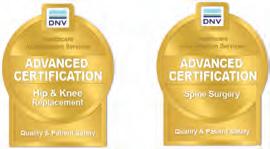




Total
Headache

Kwame Ennin, MD, MBA, is a fellowship-trained board-certified orthopedic surgeon at Texas Joint Institute in McKinney and Plano, Texas who is an expert in hip and knee replacement procedures, adult reconstructive surgery, and nonoperative osteoarthritis care.
Dr. Ennin earned his undergraduate degree in biochemistry from the State University of New York in Stony Brook. He then went on to receive his medical education at the University of Cincinnati College of Medicine, before completing his general internship and orthopedic surgery residency at The University of Texas Southwestern Medical Center in Dallas. He is fellowship-trained in adult reconstructive surgery from William Beaumont Hospital in Michigan.
Dr. Ennin has a keen desire to educate. He is a presenter and educator to his colleagues regarding direct anterior total hip arthroplasty, total knee arthroplasty, revision total knee arthroplasty, partial knee replacement, and robotic surgery. He is committed to ensuring that the best understandings and techniques are available to all surgeons in the orthopedic community. Dr. Ennin is passionate about research. He has, throughout his career, been involved in and published numerous peer-reviewed studies.
Dr. Ennin has been a leader in the North Texas orthopedic community since 2015. He delivers personalized, patientcentered, evidence-based care for his patients. He is committed to taking care of his patient’s joints for their lifetime.
Dr. Ennin specializes in:
• Hip Replacement Surgery
• Knee Replacement Surgery
• Revision Hip and Knee Replacement Surgery
• Orthopedic Surgery
• Osteoarthritis



Donald W. Hohman, MD
J. Stephen Appleton, MD
Alexander S. Greenstein, MD
Raj Yalamanchili, MD
Kwame A. Ennin, MD
Samuel K. Stephenson, MD J. Conner Ryan, MD

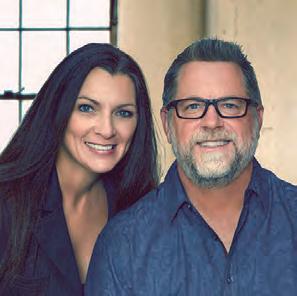
Welcome to this edition of LIVING WELL Magazine, where we shine a light on the people and ideas that inspire us to lead lives of health, happiness, and purpose. At the heart of this issue is our cover story on Dr. Charles Toulson, a groundbreaking orthopedic surgeon whose dedication to excellence is transforming lives across North Texas. From pioneering minimally invasive techniques to numerous patient success stories, Dr. Toulson exemplifieswhat it means to live with passion and purpose. His innovative work in robotic-assisted joint replacement is not only redefinig orthopedic care but also helping patients reclaim mobility and joy in their daily lives. Ths story on page 8 offers a glimpse into the remarkable journey of a man committed to making a difference—one step at a time.
Ths is also our annual Top Lawyers issue, recognizing the region’s most skilled and dedicated legal professionals. These attorneys have demonstrated excellence in their filds, from family law to corporate litigation, and their commitment to justice and advocacy is truly commendable. Whether you’re seeking legal expertise for personal or business matters, this list highlights the best of the best in our community.
Our celebrity spotlight on Demi Moore highlights reinvention—both in career and in life. From her early years in Hollywood to her recent return to the awards stage with The Substance, Moore’s story is a powerful reminder that life’s most rewarding chapters are often the ones we never saw coming. Be sure to watch this year’s Oscars on March 2 to see if she takes home the award for her performance in Th Substance. In the meantime, check out her story on page 24.
But reinvention isn’t just for the stars—it’s for all of us. In Supporting a Grieving Heart (on page 16), we explore how to show up for those experiencing loss with true empathy and presence. Grief doesn’t come with a rulebook, but small gestures of kindness can make a world of difference.
For those feeling stuck in the idea that adventure is reserved for the young, Adventure Has No Expiration, on page 44, proves otherwise. There’s no deadline on pursuing passions, traveling to new places, or trying something for the fist time. Whether it’s picking up a paintbrush, tackling a long-overdue bucket list item, or stepping outside of a comfort zone, adventure is always an option.
At its core, this issue is about embracing life fully—through every high, every challenge, and every unexpected twist. Whether you’re reinventing yourself, helping a loved one navigate grief, embracing adventure, or making your home a sanctuary, we hope these stories inspire you to live well—whatever that means to you.
Be well!

PRESIDENT & CEO
SAM HOUSTON
VICE PRESIDENT & CFO SPRING HOUSTON
EDITOR, FEATURE WRITER & SOCIAL MEDIA
SONDRA BARR
ART DIRECTOR
VANESSA FRYER
ACCOUNTS MANAGER JENNIFER BEAVERS
WEBSITE LYDIA ROGERS
ADVERTISING & SALES
TEXAS: Denton County, Dallas County, Collin County
TEXAS & OKLAHOMA: Texoma Area
WRITE TO US:
Tell us who you would like to see featured on the cover, or what subjects you would like covered in upcoming editions of LIVING WELL MAGAZINE at info@livingwellmag.com
SUBSCRIPTIONS & CUSTOMER INQUIRIES
Houstons of Dallas Publishing, Inc. 102 E. Broadway, #901 Prosper, TX 75078
www.LivingWellmag.com
Phone: (214) 507-1000 Fax: (855) 248-2132
LIVING WELL MAGAZINE is a source for quality educational articles on living a healthy, vibrant life. Our focus is on connecting our readers with the latest information on a host of topics relevant to their evolving life. From cutting edge medical news and procedures to top-tier financial, legal and lifestyle information. Connecting readers to leading medical and business professionals in their community in Texas and Oklahoma.
MARCH/APRIL 2025 All advertisements in this Magazine are placed by third parties. We do not control or endorse either the advertisements or their content. Further, we do not
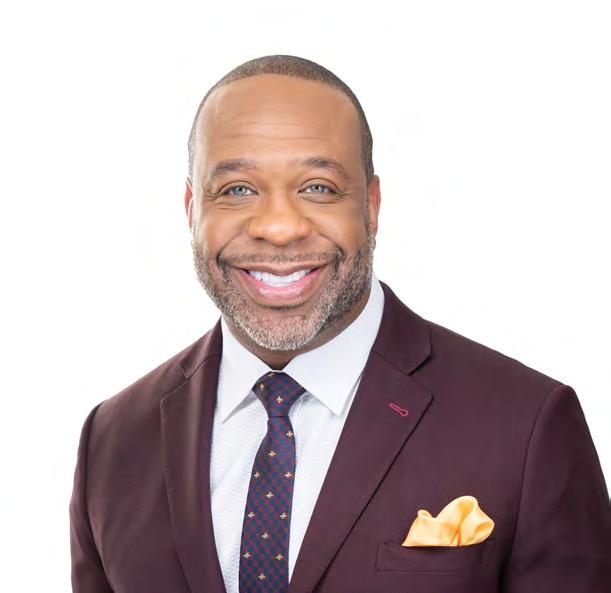


DFW Wound Care Center is a group of wound care specialists in all of the DFW area. They are fellow trained surgeons, and board certified in wound care and reconstructive surgery. All physicians have also completed an intense residency and fellowship in the area of limb salvage, and foot and ankle surgery. When it comes to wound care and limb salvage, DFW Wound Care Center has the knowledge and experience to successfully treat your condition. As a result, patients from all over the country seek to be treated by DFW Wound Care Center.
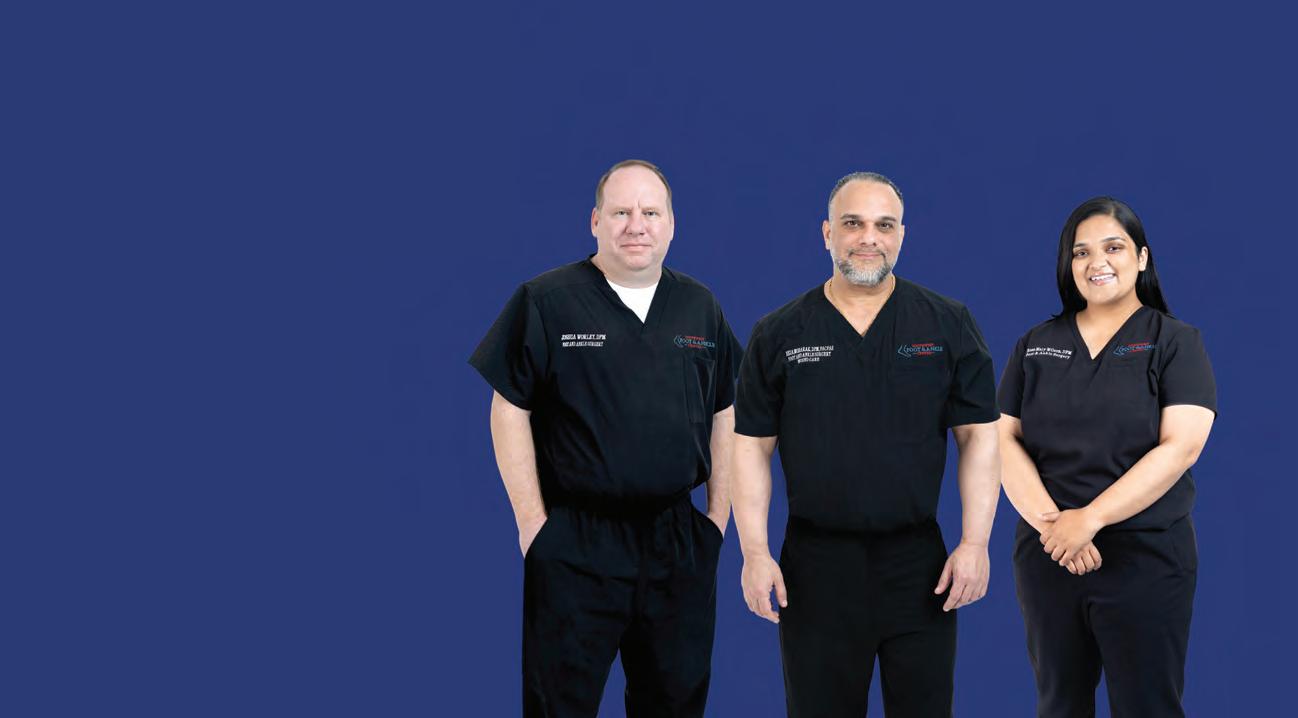
Whether caused by diabetes, infection or disease, any wound that will not heal can be very serious. If you are experiencing a wound or ulcer that will not properly heal, our wound care center can provide a range of expert treatment options best in each case. We offer non-surgical and surgical treatments for:
Diabetic Wounds & Ulcers
Arterial Ulcers
Infected Wounds
Open Wounds
Pressure Ulcers
Vascular Wounds
Acute Wounds
Non-Healing Wounds
Chronic Wounds
Surgical Wounds
Traumatic Wounds




PLANO CLINIC 5804 Coit Road, Ste. 100 Plano, TX 75023
LEWISVILLE CLINIC
502 N. Valley Pkwy., #2 Lewisville, TX 75067
IRVING CLINIC
6161 N. State Hwy. 161, Ste. 320 Irving, TX 75038
DESOTO CLINIC
714 N. Hampton Rd. DeSoto, TX 75115

Brian Nwannunu, MD, MS, is an orthopedic surgeon specializing in hip and knee replacement. He care for patients at Texas Joint Institute in McKinney, Texas.
Dr. Nwannunu, a native of Dallas, graduated Valedictorian from the High School for Health Professions at Townview Magnet Center in DISD. He then earned his bachelor’s degree in Biology at Morehouse College in Atlanta, Georgia, where he was part of the Morehouse College Honors Program. Upon graduation, he completed his master’s degree in Physiology at Georgetown University in Washington, D.C., with a concentration on complementary and alternative medicine. Dr. Nwannunu then graduated with his medical degree from Howard University College of Medicine in Washington, D.C., where he was inducted into the Alpha Omega Alpha Honor Medical Society.
Dr. Nwannunu completed his residency in orthopedic surgery at the John Peter Smith Health Network in Fort Worth, Texas, before pursuing additional training with a fellowship in adult reconstruction at Baylor College of Medicine in Houston, Texas. In addition to his clinical training, Dr. Nwannunu enjoys mission work abroad, providing medical care and health education to populations in need.
He is a member of the American Medical Association, National Medical Association, American Academy of Orthopaedic Surgeons and the American Association of Hip and Knee Surgeons.
When not working, Dr. Nwannunu enjoys basketball, weight training, outdoor activities, attending art and music festivals, traveling, world news, and reading.

CHARLES TOULSON, MD, MBA
Charles Toulson, MD, MBA, is an orthopedic surgeon who is committed to excellence. From a young age, he realized that with his aptitude for medicine, he could help people living with chronic pain and dedicated his life to become a pioneer in the fild of orthopedic surgery.
Board-certifid and fellowship-trained, Dr. Toulson’s specialties and interests include adult hip and knee reconstruction, adult hip and knee revisions, and state-of-the-art robotic-assisted joint replacement. He’s regarded by his patients and peers as one of the leading orthopedic surgeons in the country.
Dr. Toulson’s impeccable educational pedigree includes a medical degree from the University of North Carolina at Chapel Hill, extensive training from Johns Hopkins Hospital, and sub-specialty training at the Hospital for Special Surgery (HSS) in New York, the number-one ranked orthopedic hospital in the country.
Affiliated with several institutions in North Texas including Medical City McKinney, Medical City Frisco and Plano, Eminent Medical Center, Baylor Scott & White Surgical Hospital at Sherman, and Texas Health Presbyterian Hospital of Allen, his esteemed reputation is one that has been hard-earned and reflcts his unwavering dedication to his craft
Not only has Dr. Toulson performed more robotic-assisted joint replacement procedures than any other surgeon in the Dallas-Fort Worth Metroplex, he has the distinction of paving the path for two major hospitals in North Texas to achieve the elite status of being accredited as Joint Replacement Centers of Excellence.
Dr. Toulson has greatly impacted orthopedic services across North Texas when he founded Alpha Orthopedics & Sports Medicine. Now, he’s excited to have joined Texas Joint Institute in February 2023. Texas Joint Institute is a comprehensive orthopedic practice with locations in Allen, Dallas, Frisco, Plano, McKinney, Sachse, and Sherman, TX. When Texas Joint Institute began, it brought together two leading orthopedic surgeons to address the bone and joint needs of patients across the DFW Metroplex. Dr. Cyrus Abbaschian and Dr. Donald W. Hohman brought their immense surgical talent to the officeat Medical City Dallas and Plano to handle complex joint reconstruction, diagnose and treat bone and softtissue sarcomas, and handle an entire spectrum of surgical and non-surgical orthopedic services. Well known for their ability to handle even the most difficult cases, the doctors continue to deliver excellent care to patients around Dallas-Fort Worth and beyond.

Known for pioneering minimally invasive surgery techniques for hip and knee replacements, including the anterior supine hip replacement surgery, Dr. Toulson’s anterior approach allows patients to immediately bend their hip freely and bear full weight after their surgery. Ths surgical technique allows him to replace a hip joint without detaching muscle from the pelvis or femur during surgery and typically results in rapid recovery times for patients. Patients are able to walk comfortably without a cane or walker in just one to two days following surgery, according to Dr. Toulson.
Dr. Toulson was the fist surgeon in the area to perform a direct anterior hip replacement with robotic assistance. Dr. Toulson also completed the fist-ever, total knee replacement for both of a patient’s knees bilaterally (simultaneously) using Robotic-Assisted Technology.
The robot assists Dr. Toulson by improving precision during the surgery. “What’s critical is the robot will not permit me to deviate outside of the plan that we have instituted in the very beginning of surgery,” details Dr. Toulson. “As the surgeon, I’m still doing the surgery, the robot is just allowing me to do it in a more precise manner.”
“Ths 3D technology allows me to see the orientation, alignment, rotation, and actual size of the implant that we will be using. So, I can actually see with 3D technology what the implant looks like and I can make adjustments in surgery to balance the ligaments inside of the knee,” Dr. Toulson continues.
“When patients come to see me with arthritis, we often try non-operative means of treatment before we talk about surgery,” says Dr. Toulson. Once non-operative options for hip or knee arthritis are exhausted, Dr. Toulson sits down with patients and details the benefits and the risks of a total joint replacement.
One of Dr. Toulson’s recent patients was suffering with severe arthritis in her knees. “I was having severe pain in my knees, I had difficulty going up and down stairs, steps, even the curb. It hurt so bad to walk, even short distances,” she says. The results of her bilateral (both) knee replacement procedure have been life changing. “ The surgery went wonderfully. I haven’t had any problems and every day it gets better and better. I can walk up the steps now getting into my home,” she says.
Highlights of success stories and the joy his patients express at the outcome of their hip or knee replacement surgeries—and how it’s changed their lives—are documented on his website, drcharlestoulson.com, with videos and moving testimonials.

DR. TOULSON IS AMONG THOSE INDIVIDUALS WHO IS GENUINE IN HIS COMPASSION AND KINDNESS. HE GREETS EVERY PATIENT WITH A WARM SMILE AND CONSIDERS EACH ONE OF THEM PART OF THE FAMILY.
It’s no surprise that Dr. Toulson has been named numerous times among the Best Doctors in Dallas for orthopedic surgery by D Magazine, Best Orthopedic Surgeons in Collin County by D Magazine, Best Orthopedic Surgeon by Living Magazine, and Best Orthopedic Surgeon by Living Well Magazine
Dr. Toulson is among those individuals who is genuine in his compassion and kindness. He welcomes every patient with a warm smile and considers each one of them part of the family. Beyond his professional pursuits, his interests are entrepreneurship (recently earned a Master’s of Business Administration from Baylor University), business development, working out, and traveling.
ALLEN
1125 Raintree Cir., Ste. 201 Allen, TX 75013 (972) 566-5255
MCKINNEY
4201 Medical Center Dr., Ste. 100 McKinney, TX 75069 (469) 796-4295
SHERMAN
204 Medical Dr., Ste. 110 Sherman, TX 75092 (469) 796-4295
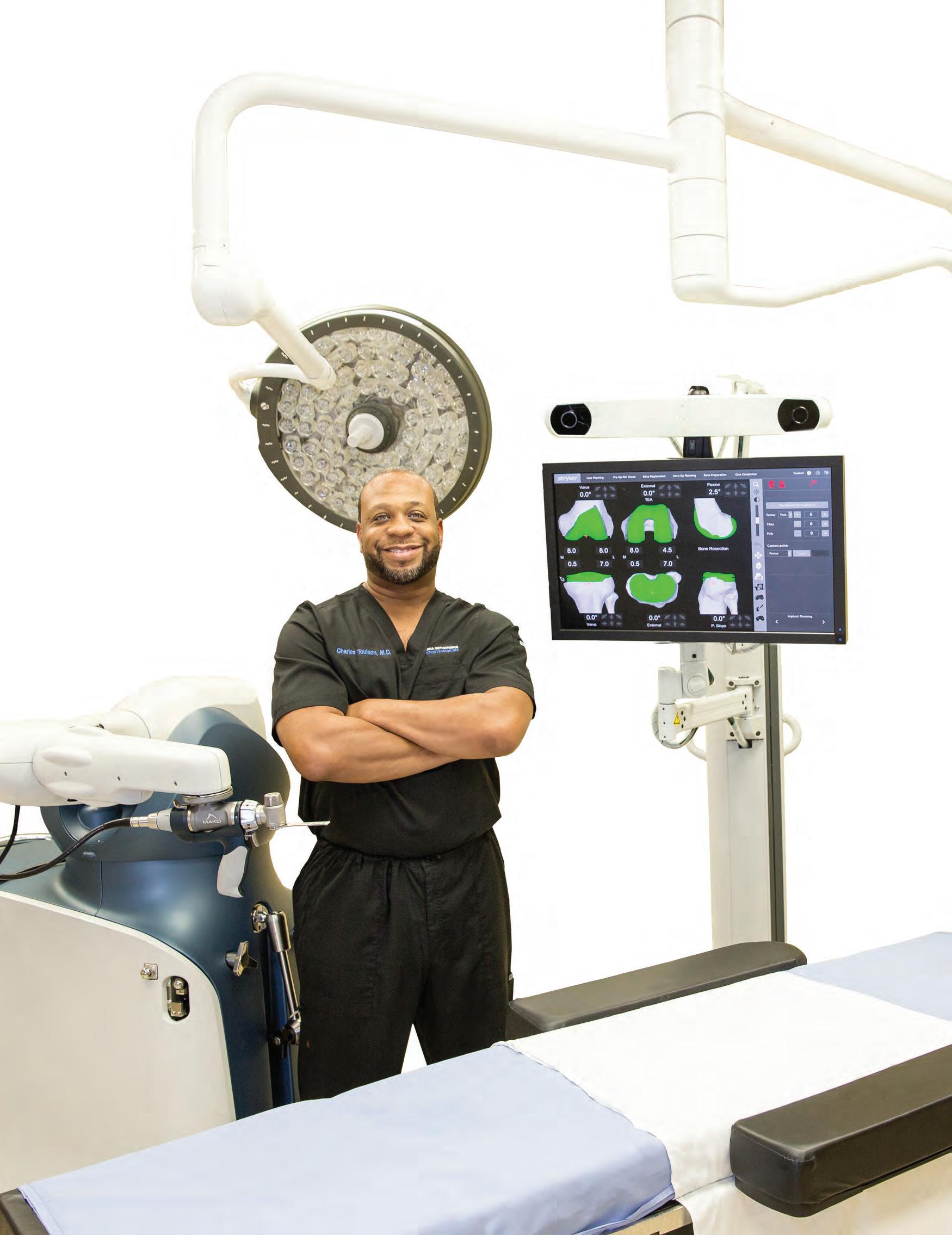
Dr. Courtney is a board-certified orthopedic spine surgeon located in Plano, Texas. A Louisiana native, he attended Louisiana State University for medical school, and completed residency at Texas A&M followed by a fellowship at the Florida Neck and Back Institute.
SPECIALTIES:
• Back Pain
• Neck Pain
• Spine Pain
• Disc Replacement
• Microdiscectomy
• Spinal Fusion
• Minimally Invasive Surgery
• Steroid Injections
• Physical Therapy
“I believe in treating each of my patients with honesty, dignity, and respect. My patients come away from our shared interactions feeling confident, assured that they are truly in the best hands. Throughout my career, I have remained laser-focused on providing world-class care and innovation to the patients I treat on a daily basis. I look forward to getting to know you!”





Florian F. Dibra, MD is a board-certified, orthopedic surgeon located in Frisco, Texas who has extensive knowledge in hip and knee orthopedics and treats operative and non-operative hip and knee arthritis. He focuses on minimally invasive muscle-sparing total hip and knee replacement, anterior hip replacement, partial knee replacement, robotic joint replacement and complex hip and knee replacement revisions. Dr. Dibra is specialized in MagicKnee and MagicHip, muscle-sparing techniques with robotic technology.
Dr. Dibra graduated with honors from Villanova University in Pennsylvania. Soon after, he received his medical degree, with cum laude honors from the esteemed Jefferson Medical College in Philadelphia, Pennsylvania. He completed his orthopedic surgery training at the University of Florida. He continued at the University of Florida Health Hospital to complete his fellowship in Adult Arthroplasty with an emphasis in hip and knee reconstruction. During Dr. Dibra’s surgical training, he accomplished several publications, book chapters, and poster presentations.
Dr. Dibra’s family consists of his wife and two children. In addition to English, he is fluent in Albanian, Italian, and proficient in Spanish.

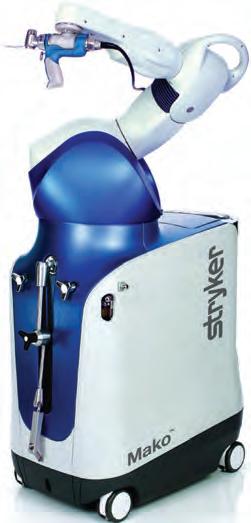


By CAROL WHITMAN
Grief is one of the most profound expressions of love, but it is also among the most complex and painful experiences a person can endure. As a grief counselor, I have seen countless individuals grapple with the void leftby the loss of someone they cherished. To witness grief is to glimpse the raw, unvarnished core of human emotion. It can be overwhelming to know how to support someone who is navigating this terrain, but your presence and compassion can make all the difference.
The fist and perhaps most important thing to remember is that grief is not something to be “fied.” Many well-meaning people feel compelled to offer solutions or platitudes in an effort to alleviate the pain. Phrases like “ They’re in a better place” or “Everything happens for a reason” may be offered with the best of intentions but often fall flat, leaving the grieving person feeling misunderstood or dismissed. Grief does not require solutions; it requires acknowledgment. Your role is not to take the pain away but to bear witness to it. Sometimes, the most powerful thing you can say is, “I’m here, and I’m so sorry for your loss.”
Grief manifests differently for everyone, shaped by the nature of the relationship lost, cultural influences, personality, and individual coping mechanisms. Some people cry openly and often, while others retreat into silence. Some may want to talk about their loved one incessantly, recounting memories and sharing stories, while others might avoid the subject altogether. It is crucial to follow the grieving person’s lead, allowing them the autonomy to navigate their emotions in their own way and time. Imposing expectations or judgments on how someone “should” grieve can inadvertently add another layer of pain.
One of the most meaningful ways to support someone in grief is simply to be present. Ths presence need not be grand or intrusive; it can be as subtle as sitting quietly beside them, holding their hand, or checking in with a phone call or text. Presence signals to the grieving person that they are not alone, even in their darkest moments. It reassures them that they are seen and supported, even when their world feels like it has shattered. Being present also means resisting the urge to turn away from their pain, no matter how uncomfortable it might make you. Grief can be messy, unpredictable, and, at times, frightening, but your willingness to remain steadfast in the face of it is a gift hat cannot be overstated.
It is also important to remember that grief does not follow a timeline. While society often expects individuals to “move on” within a certain period, the reality is that grief ebbs and flws, often resurfacing in waves long after the initial loss. Birthdays, anniversaries, and holidays can be especially poignant reminders of what has been lost. Offering support during these times—perhaps by sending a thoughtful note, offering to accompany them to a gathering, or simply acknowledging the signifiance of the day—can provide immense comfort. Even long after the loss, small gestures of remembrance and care can reinforce that their loved one has not been forgotten.
Listening is another powerful tool in supporting someone through grief. When a grieving person chooses to open up, they are entrust-
ing you with their most vulnerable thoughts and feelings. Listen without interruption, judgment, or the need to interject your own experiences. Resist the urge to compare their grief to something you have endured; each loss is unique, and attempting to draw parallels can sometimes diminish their experience. Instead, offer a safe space where they feel free to express whatever is on their mind, whether it is sorrow, anger, guilt, or even moments of unexpected joy.
Practical support can also be invaluable during a time of loss. Grief can be all-consuming, leaving little energy for everyday tasks like cooking, cleaning, or managing responsibilities. Offering to prepare a meal, run errands, or help with childcare can alleviate some of the burdens they may be facing. Rather than saying, “Let me know if you need anything,” which places the responsibility on them to reach out, try offering specifichelp: “I’d love to bring dinner by this week. Would Wednesday or Friday work better?” Ths approach is both thoughtful and actionable, showing that you are genuinely committed to easing their load.
While it is natural to want to provide comfort, it is also important to respect boundaries. Some grieving individuals may need space to process their emotions privately. Others may prefer to keep their routines intact as a way of maintaining a sense of normalcy. Pay attention to cues and be sensitive to their needs, understanding that these may shiftover time. Grief is not linear, and what is helpful one day might feel overwhelming the next. Flexibility and patience are key.
For those who are deeply entrenched in grief, professional support may become necessary. It is not uncommon for individuals to feel hesitant or even resistant to seeking counseling or therapy. Gently suggesting the idea, without pressure or judgment, can plant a seed. Let them know that reaching out for professional support is not a sign of weakness but an act of courage and self-care. Sometimes, simply normalizing the idea—”Many people fid it helpful to talk to someone who specializes in grief”—can make the prospect feel less daunting. Offering to drive them to counseling and wait in the car might make their fist step easier.
If you’re someone offering support while also grieving, it is equally important to care for yourself. Grief can be emotionally taxing. Allow yourself to acknowledge your own feelings and seek support if needed. Surrounding yourself with a network of friends, family, or even a counselor can help you navigate the complexities of being a companion to someone in grief. By caring for yourself, you ensure that you can continue to show up fully and compassionately for your loved one.
Ultimately, supporting someone through grief is about honoring the depth of their loss and the love that underpins it. It is about showing up, not with answers or fies, but with an open heart and a willingness to walk alongside them in their pain. It is about bearing witness to their sorrow while holding hope for their healing, however distant that may seem. Grief is a testament to the bonds we share, and your support can be a lifeline in helping someone fid their way through the darkness toward a place of light and remembrance.
Macular Degeneration
Diabetic Eye Disease
Retinal Vein & Artery Occlusions
Flashes & Floaters
Retinal Tears & Detachments
Macular Pucker/Epiretinal
Membrane
Macular Holes
Uveitis

At Texas Macula & Retina, our mission is to provide exceptional eye care with a focus on the diagnosis, treatment, and management of retinal disorders.
Dr. Adams is a board-certified Ophthalmologist and Ophthalmic Surgeon specializing in Vitreoretinal Surgery. His principal areas of interest include age-related macular degeneration, diabetic retinopathy, retinal detachment repair, macular surgery, retinal lasers, and secondary intraocular lens implantation.
Dr. Adams and his team are committed to preserving and improving the vision and overall quality of life for our patients by offering the most advanced and personalized retina care available.

By MATTHEW K. ADAMS, MD, MBA

Diabetes is a chronic condition that affects millions of people worldwide, and while its impact on blood sugar levels is well-known, its effects on vision are often overlooked. Understanding how diabetes can affect eye health is crucial for all people who have this condition. It’s important to understand the various ways diabetes can impact your eyes so you can protect your vision.
Understanding Diabetic Eye Disease
Diabetes primarily affects the eyes through a group of conditions collectively known as diabetic eye disease. The most common of these conditions are diabetic retinopathy, diabetic macular edema, and cataracts. Each of these conditions can lead to vision impairment or even blindness if left utreated.
Diabetic Retinopathy
Diabetic retinopathy is the most common cause of vision loss among people with diabetes and is a leading cause of blindness among working-aged adults. Ths condition occurs when high blood sugar levels damage the blood vessels in the retina, the light-sensitive tissue at the back of the eye. There are two stages of diabetic retinopathy: non-proliferative and proliferative. In the non-proliferative stage, the blood vessels in the retina may swell and leak fluid, causing blurry vision. In the more advanced proliferative stage, new, abnormal blood vessels begin to grow on the surface of the retina. These vessels can bleed into the vitreous (the clear, gel-like substance inside the eye), leading to severe vision loss or even retinal detachment.
Diabetic Macular Edema (DME)
DME is a complication of diabetic retinopathy and occurs when fluid leaks into the macula, the part of the retina responsible for sharp, central vision. Ths leakage causes the macula to swell, leading to blurry or wavy vision. DME is a major cause of vision loss in people with diabetes and can make it difficult to perform tasks that require clear vision, such as reading, driving, or working on a computer.
Cataracts
While cataracts can develop in anyone as they age, people with diabetes are at a signifiantly higher risk of developing them at a younger age. A cataract occurs when the eye’s lens becomes cloudy, leading to vision that is blurry, dim, or tinted. In individ-
uals with diabetes, high blood sugar levels can cause the lens to swell and change its clarity, accelerating the formation of cataracts. Ths can make it challenging to see clearly, especially in lowlight conditions (i.e. driving at night).
Your Vision: What You Can Do
The good news is that by managing your diabetes effectively and getting regular eye exams, you can signifiantly reduce your risk of developing serious eye problems. Here are some steps you can take to protect your vision:
1. Control Your Blood Sugar Levels
The most important step in preventing diabetic eye disease is to keep your blood sugar levels within your target range. Consistently high blood sugar can damage the blood vessels in your eyes, so it’s crucial to monitor your levels regularly and follow your healthcare provider’s recommendations for managing your diabetes.
2. 2. Monitor Blood Pressure and Cholesterol
High blood pressure and high cholesterol can further increase your risk of developing diabetic eye disease. Managing these conditions through medication, diet, and exercise can help protect your eyes and overall health.
3. 3. Get Regular Eye Exams
Annual comprehensive eye exams by a retina specialist are essential for detecting diabetic eye disease in its early stages, often before you notice any symptoms. During these exams, your eye doctor will dilate your pupils to get a better view of the retina and check for signs of damage. Early detection can lead to more effective treatment and a better outcome for your vision.
4. 4. Adopt a Healthy Lifestyle
Eating a balanced diet, exercising regularly, and maintaining a healthy weight can help you manage your diabetes and reduce the risk of complications, including those that affect your eyes. Incorporating foods rich in antioxidants, such as leafy greens, fruits, and nuts, can also support eye health.
By controlling your blood sugar levels, getting regular eye exams, and adopting a healthy lifestyle, you can reduce your risk of diabetic eye disease and maintain clear vision for years to come. Remember, your eyes are not only the windows to your soul but also to your overall health. Don’t take them for granted.
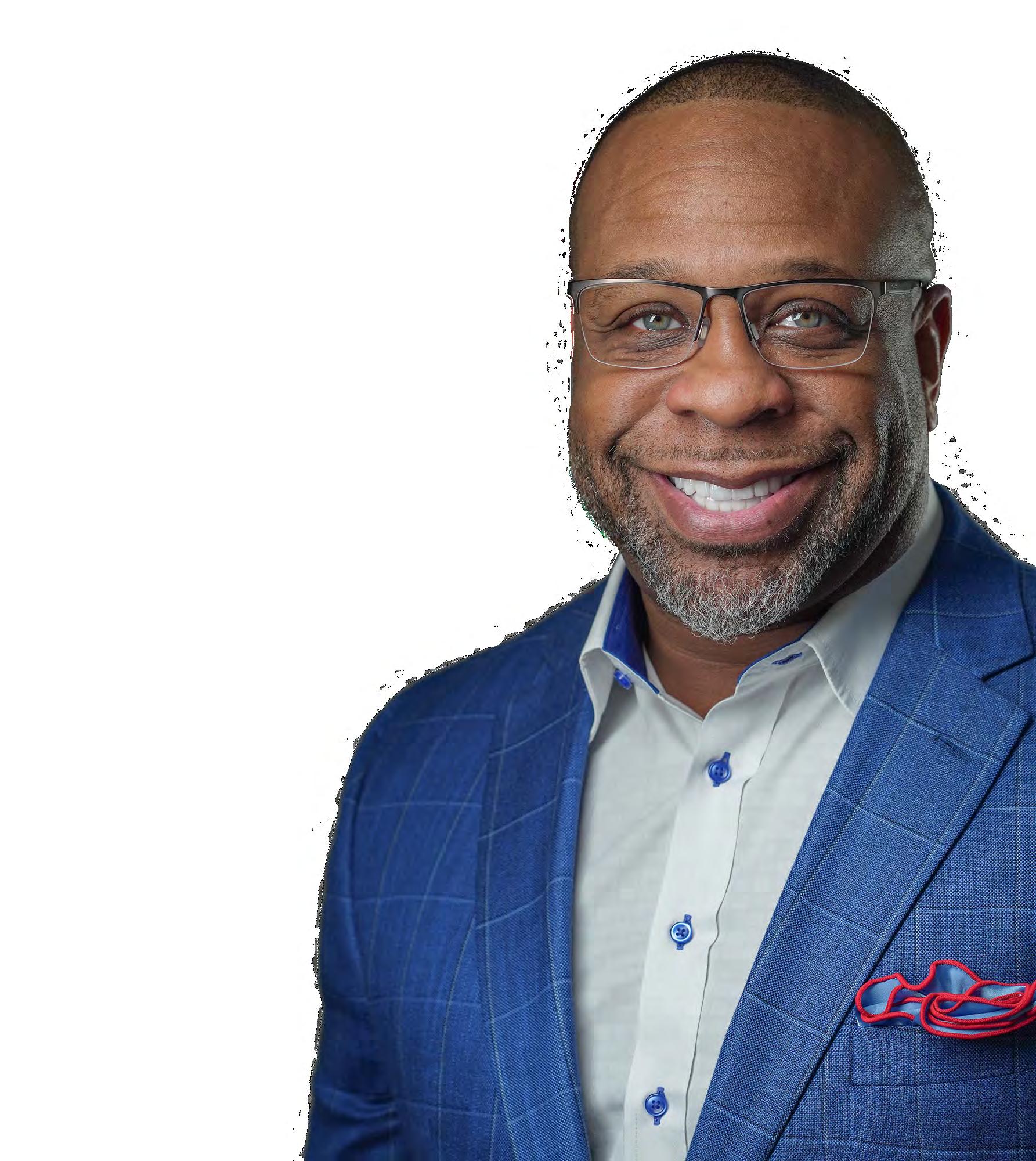

1125 Raintree Cir., Ste. 201 Allen, TX 75013 (972) 566-5255
4201 Medical Center Dr., Ste. 100 McKinney, TX 75069 (469) 796-4295
204 Medical Dr., Ste. 110 Sherman, TX 75092 (469) 796-4295
Please call to make an appointment.










VUDHI SLABISAK, MD OrthopaedicSpineSurgeon





BRUCE MARKMAN, MD OrthopaedicSurgeon&Sports MedicineSpecialist


JAMES STANLEY, MD OrthopaedicSpineSurgeon





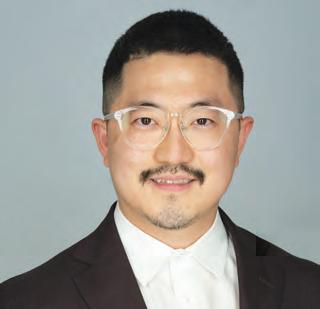

STEVE HONG, MD Interventional Pain ManagementSpecialist








RAHUL BANERJEE, MD OrthopaedicSurgeon

GEOFFREY G. GLIDDEN, MD OrthopaedicSurgeon










AMIR MALIK, MD Neurosurgeon





KHAWAJA IKRAM, DO OrthopaedicSurgeon


BRIANA HODGSON, PA-C OrthopaedicSurgery PhysicianAssistant

CHARLES MARDER, DPM Podiatrist,Foot&AnkleSurgeon
If you’re suffering from pain or an athletic injury, schedule an appointment with your preferred NTOS location for effective, compassionate treatment.

By SONDRA BARR
“I THOUGHT MAYBE I WAS DONE.”
Demi Moore’s voice trembled as she said those words during her acceptance speech at the Golden Globes earlier this year. Standing on stage, the now 62-year-old actress’s raw honesty captivated the audience. Hollywood’s ultimate survivor had just won her fist major acting award—and her journey to that moment is anything but ordinary.
For decades, Demi Moore has been a name synonymous with fame and beauty. From her breakout role in St. Elmo’s Fire to her career-definig performance in Ghost, Moore has consistently defid expectations. And now, with her fist Oscar nomination for her haunting portrayal of Elisabeth Sparkle in Th Substance, she’s proving that reinvention is possible at any age.
Born in Roswell, New Mexico, in 1962, Moore grew up in a world far removed from Hollywood glamour. Her father, a charming but troubled man, and her mother, a dreamer chasing stability, moved the family frequently. By the time Moore was 15, she had attended more schools than she could count.
“I didn’t feel like I belonged anywhere,” she shared in a candid interview with Vanity Fair from the ’90s. “Every six months, I was a new version of myself, trying to fit into someone else’s world.”
That sense of impermanence shaped her early ambitions. When she settled in West Hollywood, a chance encounter with actress Nastassja Kinski gave Moore a glimpse of what confidece and success could look like. Inspired, she dropped out of high school at 16 to pursue acting.
Her fist big break came not on the silver screen but in the world of daytime television. At just 18, Moore landed a role on the soap opera General Hospital as investigative journalist Jackie Templeton, a character whose determination and grit mirrored Moore’s own hunger for success.
Around the same time, Moore married musician Freddy Moore, whose surname she adopted both personally and professionally. The relationship, while short-lived, played a signifiant role in her early life. “Freddy taught me to believe in myself,” she shared in her memoir Inside Out. “He encouraged me to pursue my dreams, even when they seemed impossible.”
But her path wasn’t linear. “I had no formal training,” Moore admitted to Interview Magazine. “I learned by throwing myself into the fie and faking it until I figued it out.”
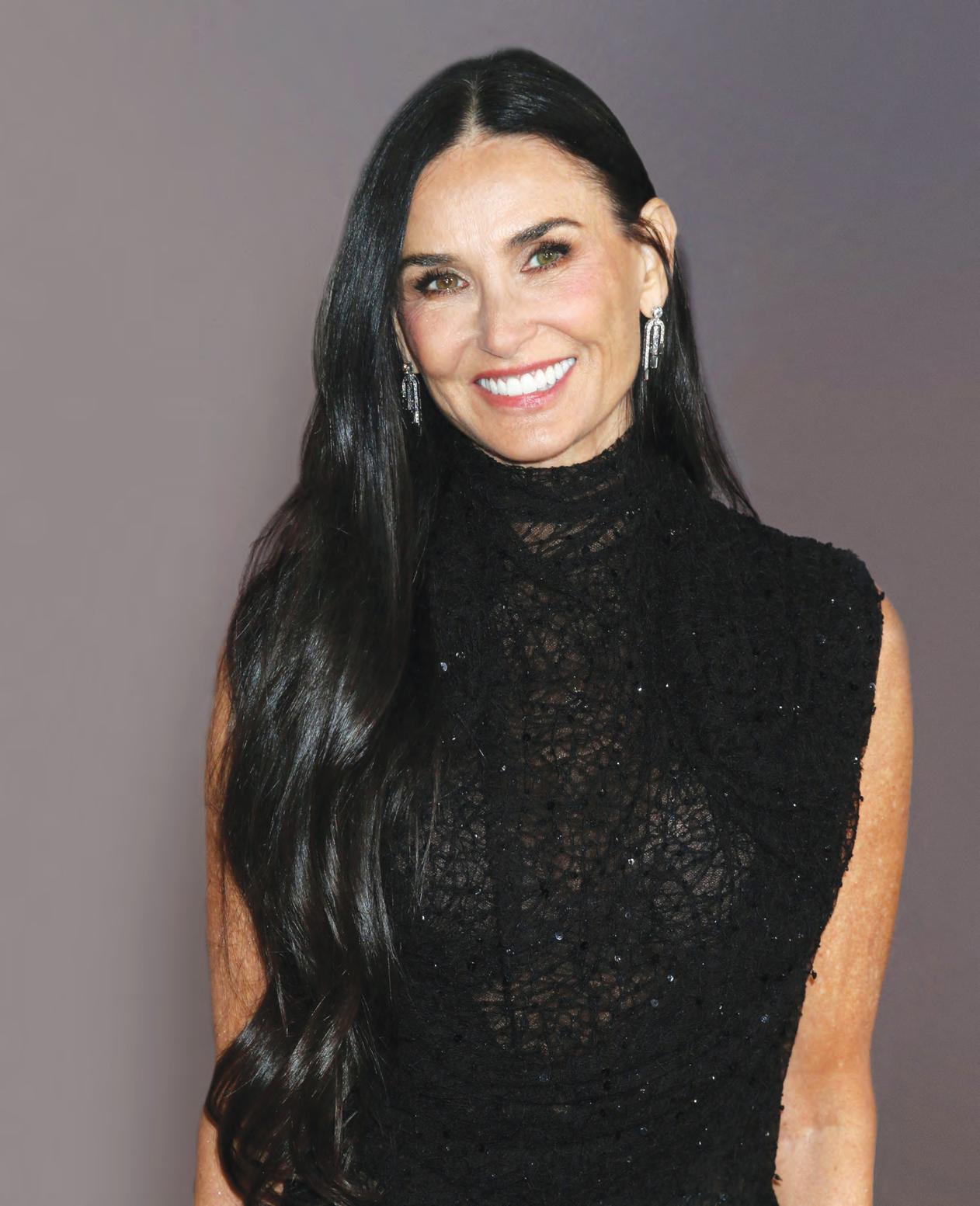
EVERY SIX MONTHS, I WAS A NEW VERSION OF MYSELF, TRYING TO FIT INTO SOMEONE ELSE’S WORLD.

WE’VE ALL BEEN THERE. TRYING TO PERFECT SOMETHING ONLY TO MAKE IT WORSE. IT’S A METAPHOR FOR SO MUCH OF LIFE.
Moore’s fist taste of fame came with her role in St. Elmo’s Fire, where she became part of the iconic Brat Pack alongside Rob Lowe, Emilio Estevez, and Ally Sheedy. The film, which captured the spirit of a generation grappling with post-college life, catapulted Moore into the spotlight. However, the pressures of newfound fame took a toll. Immersed in the fast-paced and often chaotic Hollywood lifestyle, Moore turned to partying as a coping mechanism.
“I was trying to numb myself,” she later admitted in her memoir Inside Out, reflcting on the period. The lifestyle threatened to derail her career before it even began. A critical turning point came when Columbia Pictures insisted she get sober to keep her role in St. Elmo’s Fire. The ultimatum forced Moore to take stock of her life. She complied, and the experience became a foundation for the resilience that would defie her career.
“ That was the fist time I realized I could take control of my own narrative,” she shared with Vanity Fair
What followed was a string of box-offichits that cemented her place in Hollywood. Ghost (1990), a supernatural love story, earned Moore widespread acclaim and established her as a leading actress. A Few Good Men (1992) showcased her commanding presence alongside Tom Cruise and Jack Nicholson. By 1996, Moore made history as the highest-paid actress for her role in Striptease. Her fearless choices and commercial appeal solidifid her position as one of Hollywood’s top stars.
However, the attention wasn’t always positive. Critics frequently dismissed her talent in favor of focusing on her appearance. “A producer once called me a ‘popcorn actress,’” Moore shared during her 2025 Golden Globes speech. “It stuck with me for years, and I let it shape how I viewed myself.”
As the ’90s faded, so did Moore’s place in the spotlight. Her muchpublicized marriage to Bruce Willis ended, and roles became harder to come by. By her 40s, Moore felt like she no longer fit Hollywood’s mold.
“I wasn’t the ingenue anymore, but I wasn’t ready to play someone’s mother either,” she told The Guardian
Her third marriage, to Ashton Kutcher, thrust her back into the tabloids, often for all the wrong reasons. When that relationship ended, Moore hit a low point. “I started questioning everything— my worth, my purpose. It was a dark time,” she admitted in her memoir, Inside Out.
But Moore’s resilience kicked in. She stepped back from the limelight, focused on raising her daughters, and found solace in writing. Her 2019 memoir became a bestseller, offering an unfliching look at her life.
Fast forward to 2024. Moore’s career reignited with Th Substance, a body-horror film that premiered at Cannes. Directed by Coralie Fargeat, the movie delves into themes of aging, vanity, and societal
pressures—subjects Moore knows intimately. Playing Elisabeth Sparkle, a former fitness icon desperate to reclaim her youth, required Moore to confront her own fears about aging.
“It wasn’t about looking glamorous,” Moore explained to W Magazine. “It was about stripping everything away and being completely raw.”
The role demanded intense vulnerability, with scenes that left Moore emotionally and physically exposed. One particularly grueling sequence involved her character obsessively applying makeup in a spiral of self-doubt, a moment Moore described as both cathartic and devastating.
“We’ve all been there,” she said in an interview with The Guardian “Trying to perfect something only to make it worse. It’s a metaphor for so much of life.”
Critics hailed her performance as a career-best, praising her fearless embodiment of a woman unraveling under the weight of societal and self-imposed expectations. The film’s exploration of identity resonated deeply with Moore.
“At its core, the film is about breaking cycles,” she said. “It’s a reminder that change is the only constant.”
For Moore, Th Substance was an opportunity to reconnect with her passion for storytelling and to challenge herself in ways she hadn’t before. Working alongside co-star Margaret Qualley, who portrayed the younger version of her character, brought a unique dynamic to the film. “Margaret and I often joked about representing two sides of the same coin,” Moore told W Magazine. “Our dynamic became a metaphor for the tension between clinging to the past and embracing the future
Away from the cameras, Moore has embraced a quieter life. She spends much of her time at her Idaho home, where she practices yoga, meditates, and dotes on her dogs. Nestled in nature, it’s her sanctuary—a place where she can unplug and reconnect with herself.
“I’ve stopped chasing perfection,” she shared with W Magazine “I’m learning to love where I am right now.”
Her daughters, Rumer, Scout, and Tallulah, remain central to her life. “ They’ve taught me more about resilience and love than I ever thought possible,” Moore shared during a conversation with The Guardian. She’s also a steady presence for her former husband Bruce Willis and his wife, Emma Heming Willis, as they navigate his ongoing health struggles. Moore’s bond with Willis remains strong. “Being there for Bruce has reminded me of the importance of showing up for the people you love, no matter what,” she shared in an interview with People Magazine earlier this year.
As she prepares for her big Oscar night on March 2, Moore is reflctive but grounded. Winning would be deeply meaningful, not just as validation for her hard work and evolution as an actress, but as a symbol of perseverance and reinvention in a career spanning decades. “Ths nomination is a cherry on top, but the real reward has been fiding peace within myself,” she told Interview. “At 62, I fially feel like I belong.”



» Staffed by 2 Licensed, Doctors of Audiology
» Hearing Aid Fittings, Maintenance and Repairs
» Invisible Fittings/Open Fittings
» Evaluation Period On All Hearing Aids
» Hearing Evaluations For All Ages
» Wireless/Connectivity Hearing Solutions
» Battery Purchase Programs
» Custom Ear Protection
» Assistive Devices


By CASSANDRA WILSON, AU.D., CCC-A, FAAA

From the moment we wake up to the time we go to sleep, sound shapes our experiences and connections to the world around us. It alerts us to danger, delivers vital information, and brings us moments of joy, laughter, or even tears. Sound is a key part of what makes life rich and engaging. However, when hearing issues arise and this vital sense begins to diminish, our ability to stay informed, entertained, and connected can suffer greatly. Over time, this loss often affects our quality of life, a sentiment frequently echoed within my clinic by those experiencing hearing impairment.
Hearing loss is a common condition that impacts individuals across all demographics, although it becomes increasingly prevalent as we age. Unfortunately, many people delay seeking treatment, often underestimating the broader effects that untreated hearing loss can have on their overall well-being. Beyond the physical implications, hearing loss can lead to social isolation, cognitive decline, and psychological challenges such as depression or anxiety. The good news is that early intervention can signifiantly reduce these negative consequences, allowing individuals to maintain a higher quality of life.
When someone suspects their hearing has declined, the fist step should be to seek the expertise of a hearing care professional, particularly an audiologist. As audiologists, we’re uniquely trained to diagnose and manage hearing and balance disorders. We perform comprehensive evaluations that go beyond simply determining whether or not a person needs hearing aids. A thorough assessment typically includes an in-depth discussion of the patient’s lifestyle, hearing habits, and specificneeds. Ths personalized approach is key to fiding effective solutions that align with the individual’s daily life.
One of the most valuable aspects of working with an audiologist is our ability to provide tailored education about hearing loss. For many people, the process of understanding why hearing loss occurs and how it affects them is crucial. A good audiologist will take the time to explain the causes of hearing impairment and the mechanics of hearing aids. We help demystify the technology, ensuring our patients feel comfortable and confidet about their options. Ths educational component often empowers individuals to make informed decisions about their hearing care, fostering a sense of partnership and trust with their audiologist.
The role of an audiologist extends far beyond fitting hearing aids. While hearing aid technology has advanced signifiantly in recent years, studies have shown that the expertise and approach of the audiologist are often the most signifiant factors influencing the success of hearing aid use. According to one large study (MarkeTrak VIII), the
clinical protocol and personalized care provided by the audiologist have a greater impact on patient outcomes than the technology itself. Ths underscores the importance of selecting a qualifid and dedicated professional to guide the hearing care journey.
Consumer feedback also highlights the critical role audiologists play in ensuring satisfaction with hearing aids. Studies conducted by the Hearing Industries Association and Consumer Reports revealed that a patient’s “delight” with their hearing aids often stems from the care and attention provided by their audiologist. Key factors contributing to this satisfaction include the audiologist’s willingness to assume patients have limited prior knowledge, their ability to educate patients about hearing loss, and their thorough explanations of how hearing aids function. Additionally, audiologists who routinely schedule follow-up appointments and address patients’ initial experiences during the fist week of wearing hearing aids were consistently praised.
These fidings highlight the value of an audiologist’s personalized care. Audiologists are not just fitting devices; they are building relationships and ensuring that patients feel supported throughout the entire process. By tailoring solutions to each individual’s unique circumstances, they maximize the effectiveness of hearing aids and improve patients’ overall satisfaction. Ths level of care can be transformative, helping patients rediscover the sounds and connections that make life fulfilling.
Hearing loss is often a progressive condition, which means that regular follow-ups are essential for monitoring changes and adjusting treatment plans as needed. Audiologists play a pivotal role in this longterm management, ensuring that patients continue to receive optimal support as their needs evolve. Ths commitment to continuity of care further distinguishes audiologists as indispensable partners in hearing health.
It is also worth noting that untreated hearing loss has been linked to broader health concerns, including an increased risk of dementia and other cognitive challenges. Audiologists are often at the forefront of identifying these risks and implementing strategies to mitigate them. Their work not only improves hearing but also contributes to overall health and well-being.
If you or someone you know is experiencing hearing difficulties, taking action sooner rather than later is key. Seeking the care of an audiologist can open the door to effective solutions, renewed connections, and an improved quality of life. Don’t wait to prioritize your hearing health. Reach out to us at Hearing Services of McKinney today and let us help you take that fist step toward reclaiming the sounds that make life meaningful.

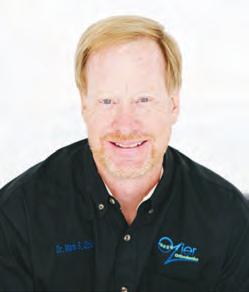



Your family has a fast and convenient ride to the airport.
DART offers service to Dallas Fort Worth International Airport and Dallas Love Field every day of the week.
DFW AIRPORT
ORANGE LINE to DFW Airport
Terminal A Station
DALLAS LOVE FIELD
GREEN OR ORANGE LINE to Inwood/Love Field Station, and then LOVE FIELD SHUTTLE (Bus Route 5) to Dallas Love Field
PLAN YOUR TRIP AT DART.ORG/AIRPORTS


By CARRIE UMSTEAD
Colon cancer, or colorectal cancer, is a type of cancer that starts in the colon or rectum. It is one of the most common types of cancer, but when detected early, it can be treated effectively. The disease often begins as non-cancerous growths known as polyps, which can develop into cancer over time if leftuntreated. Understanding the signs and symptoms play a crucial role in early detection and prevention.

tional modifiable risk factors that can elevate the likelihood of developing colorectal cancer.
In its early stages, colon cancer may not cause noticeable symptoms, which is why regular screening is essential, especially for those over the age of 50 or with risk factors. However, as the cancer progresses, it can produce a range of symptoms that affect digestion and bowel habits.
One of the most common signs is a change in bowel habits that lasts for several weeks. Ths could include persistent diarrhea or constipation, or a noticeable difference in the consistency of stools. These changes often occur without any apparent cause and may be accompanied by a feeling that the bowel does not completely empty.
Another potential sign is the presence of blood in the stool, which may appear bright red or dark, making the stool look almost black. Blood in the stool may be accompanied by rectal bleeding. While not always indicative of colon cancer—conditions such as hemorrhoids or anal fissures can also cause bleeding—persistent or unexplained bleeding should always be checked by a healthcare professional.
Unexplained weight loss and fatigue can also be early signs of colon cancer. Weight loss occurs as the body uses more energy to fiht the cancer, and fatigue may develop due to anemia from blood loss in the digestive tract. Ths can leave individuals feeling unusually tired even after adequate rest.
Abdominal discomfort, such as cramping, bloating, or pain, may develop as the tumor grows, obstructing the passage of stool. Ths can lead to a feeling of fullness, even after a small meal. In some cases, advanced colon cancer can cause nausea or vomiting if a bowel obstruction occurs.
While the exact cause of colon cancer is not fully understood, several risk factors can increase the likelihood of developing the disease. Age is a signifiant factor, with most cases occurring in people over 50. A family history of colon cancer or certain genetic conditions, such as Lynch syndrome or familial adenomatous polyposis, further elevates the risk.
Lifestyle choices also play a role. A diet high in red or processed meats has been linked to an increased risk of colon cancer, as has a sedentary lifestyle. Obesity, smoking, and heavy alcohol use are addi-
Preventing colon cancer involves a combination of regular screening, healthy lifestyle choices, and sometimes medical interventions for those at high risk. Screening is the most effective way to detect colon cancer early or even prevent it by identifying and removing precancerous polyps. The American Cancer Society recommends that individuals at average risk start screening at age 45, while those with a family history or other risk factors may need to begin earlier.
Colonoscopy is the most commonly recommended screening test because it allows for the direct visualization and removal of polyps during the procedure. Other screening options include stool-based tests, which check for hidden blood or abnormal DNA in the stool, and flexble sigmoidoscopy, which examines the lower part of the colon.
Diet plays an essential role in reducing the risk of colon cancer. A diet rich in fruits, vegetables, and whole grains provides fiber, vitamins, and antioxidants, which help protect against cancer. Fiber, in particular, promotes healthy digestion and helps reduce the time that waste spends in the digestive tract, potentially limiting exposure to harmful substances. Consuming less red and processed meat, along with avoiding excessive alcohol, further contributes to a lower risk. Incorporating fish, lean poultry, and plant-based protein sources can be benefical.
Regular physical activity has been shown to decrease the risk of cancer as exercise helps maintain a healthy weight and regulate hormone levels that may contribute to cancer growth. Even moderate activities such as walking can make a signifiant difference in overall health.
Smoking cessation is another crucial preventive measure. Tobacco use is not only linked to lung cancer but also increases the risk of many other cancers, including colon cancer.
For individuals with a high genetic risk of colon cancer, medical interventions may be necessary. Preventive surgeries may be considered in those with inherited conditions like Lynch syndrome. Genetic counseling can help assess risk and guide these decisions.
Colon cancer is highly treatable when detected early, with survival rates signifiantly higher for cancers caught before they spread. That’s why it’s important to not ignore symptoms or delay routine screenings. Seeking medical advice without hesitation can be life-saving.

Dallas Brain, Spine and Skull Base Surgery is a neurosurgical practice that offers over 40 years of experience providing an innovative and collaborative state of the art approach to the care of patients with challenging neurological problems from around the world. Dr. Beshay and Dr. Coimbra have developed unique expertise in the treatment of brain tumors becoming the referral destination for the treatment of patients, especially those with complex or difficult to access tumors. They have also shown a commitment to the development of minimally invasive neurosurgical procedures including the most modern expanded trans–nasal endoscopic skull base surgical techniques and focused extradural approaches to skull base tumors.
Dr. Beshay’s interests include tumors of the brain and spine, minimally invasive spine surgery, complex spinal reconstruction, and epilepsy surgery. In addition to surgical treatment of intracranial and spinal disease, he has an interest in neurological bleeding and its reversal. Dr. Beshay’s clinical interests include: benign and malignant brain tumors, neuroendoscopy, epilepsy surgery, intracranial hemorrhage, cranial/ spinal trauma, minimally invasive spine surgery, complex spinal reconstruction with an interest in C1–C2 and occipito–cervical junction disease.
Dr. Coimbra restricts his practice mostly to intracranial neurosurgery. This selective tertiary practice has fostered the opportunity to develop unique expertise and commitment to the treatment of malignant and benign brain tumors. He is an expert in the minimally invasive resection of the most complex skull base tumors, including meningiomas, acoustic neuromas, and pituitary tumors. He employs CyberKnife radiation therapy, endoscopic endonasal techniques, and an array of focused skull base approaches to create a customized treatment plan for each patient in his practice. These innovative approaches allow resection of deep, difficult, and complex tumors with minimal brain tissue manipulation and maximal preservation of function.
Dr. Coimbra and Dr. Beshay believe in customized patient care and a team approach to medicine with attention to careful selection of the least invasive and most effective treatment for each patient. Their commitment to this philosophy has resulted in maximum preservation of function, less discomfort, shorter hospital stays and durable favorable outcomes for their patients.

ROGERS
RN,
CHPN,
Dear Olivia,
My 94-year-old grandmother has been living alone in her home, but she has had multiple falls lately, and we are concerned that she may need more support with her care. As we look at the best caregiving options to ensure she is not alone, how do we know when she is ready for hospice? ~Unsure of Next Steps
Dear Unsure of Next Steps, I am glad that you as a family are pursuing options for caregiving. This is often the most difficult part of the aging process—determining when it is not safe for someone to live alone anymore. There are many options for supporting an aging loved one such as bringing caregiving support into the home, looking assisted living, memory care or skilled nursing facilities, as well as other long-term care solutions. Often a Medical Social Worker (MSW) can assist with finding the right solution. You can ask her primary care physician if this resource is available to your grandmother. In terms of the medical component of her care and determining when someone is ready for the hospice benefit,






there are several easy questions to consider. First, an increase or onset of falls is important to track, so keep notes on when the falls occur and if there are any injuries. Also, consider what activities of daily living, such as bathing, toileting, dressing and preparing food, may be becoming more difficult, as this decline is important in hospice consideration. Also, as people age or begin to decline, they may eat less, and weight loss may become evident, which is a factor in determining decline. Another indicator of decline is how often an individual is hospitalized or visits the emergency department; keep a list of these encounters. Lastly, if a loved one is expressing that they no longer wish to pursue curative therapy or go to the hospital, that is a sign that it may be time to have a conversation with the physician about next steps in care. All of these factors play a role in the family beginning to consider hospice care, and the physician determining if it is the right level of care. Best wishes to you, as we all want to ensure our loved ones get the best care possible at the right time.
~Olivia

To schedule your free in-home informational visit please call (214) 689-0000 or email gethelp@vnatexas.org For volunteer opportunities please call (214) 689-2271 or email volunteer@vnatexas.org VNA Hospice & Supportive
Focuses on quality of life for the patient and family at a time when comfort, compassion and clinical expertise matter most.

By JAMES CARTER
Sleep is a cornerstone of health and well-being that is often not taken seriously enough. For adults, adequate sleep is not merely a matter of feeling rested; it is a biological necessity that impacts nearly every aspect of physical, emotional, and cognitive function. Despite its importance, millions of people struggle to prioritize or achieve quality sleep, leading to short- and long-term health consequences. Sleep serves as the body’s natural repair system, playing a critical role in processes like memory consolidation, immune function, and cellular restoration. It supports heart health, hormonal balance, and mental clarity. Chronic sleep deprivation, however, can disrupt these processes and contribute to a host of medical issues, including cardiovascular disease, obesity, diabetes, and weakened immune defenses. Furthermore, sleep deprivation is closely linked to mental health con-

ditions such as depression, anxiety, and mood disorders, forming a vicious cycle where poor sleep exacerbates these issues, which in turn interfere with rest.
Sleep disorders are a common barrier to restorative rest. Insomnia, one of the most prevalent, is characterized by difficulty falling or staying asleep, often accompanied by feelings of fatigue, irritability, and impaired concentration. Obstructive sleep apnea (OSA), another signifiant disorder, occurs when the airway becomes blocked during sleep, leading to repeated awakenings throughout the night. Symptoms of OSA include loud snoring, gasping for air, and excessive daytime sleepiness. Restless legs syndrome (RLS) is another condition that disrupts sleep, causing uncomfortable sensations in the legs and
an uncontrollable urge to move them, particularly during periods of rest or at night. These disorders not only diminish sleep quality but also increase the risk of developing chronic health problems.
Recognizing the signs of a sleep disorder is essential for seeking timely intervention. Persistent fatigue despite adequate time in bed, loud snoring, difficulty concentrating, or a partner’s observation of irregular breathing during sleep are all red flags that warrant medical evaluation. Consultation with a healthcare provider can lead to proper diagnosis and management, which may include treatments like continuous positive airway pressure (CPAP) therapy for OSA, medications for RLS, or cognitive behavioral therapy for insomnia (CBT-I), a highly effective, evidence-based approach.
While addressing medical conditions is critical, many sleep issues stem from poor sleep hygiene—the behaviors and environmental factors that influence sleep quality. Establishing a consistent sleep schedule is one of the most effective ways to regulate the body’s internal clock, or circadian rhythm. Going to bed and waking up at the same time, even on weekends, reinforces this natural rhythm and improves sleep quality over time.
Your sleep environment also plays a signifiant role. Your bedroom should be a sanctuary for rest, free from distractions like noise, light, and electronic devices. Investing in blackout curtains, a comfortable mattress, and a supportive pillow can make a substantial difference. Reducing exposure to blue light from screens in the hour leading up to bedtime is particularly important, as it interferes with the production of melatonin, the hormone that regulates sleep. Instead of scrolling through a phone or watching television, consider calming activities such as reading a book or taking a warm bath.
Stress and anxiety are among the most common culprits of sleep disturbances. The mind’s tendency to ruminate on worries make it difficult to unwind. Developing a bedtime routine that includes mindfulness or meditation can help quiet the mind and prepare the body for sleep. Deep breathing exercises, progressive muscle relaxation, or gentle stretches are also effective ways to signal to the body that it is time to relax.
Your diet and lifestyle choices throughout your day signifiantly impacts sleep at night. Consuming caffeine or nicotine in the late afternoon or evening can interfere with the ability to fall asleep, as these substances are stimulants that delay the onset of drowsiness. Similarly, while alcohol may initially induce sleep, it disrupts the later stages of the sleep cycle, leading to fragmented and less restorative rest. Limiting these substances and opting for sleep-friendly alternatives like herbal teas.
Regular exercise has been shown to improve both the duration and quality of sleep by reducing stress and increasing the time spent in deep sleep stages. However, it is important to time exercise appropriately; vigorous workouts close to bedtime can have the opposite effect by increasing alertness. Aim for moderate-intensity exercise earlier in the day to reap the sleep-related benefits.
When struggling to fall asleep, having patience and avoiding frustration is key. Lying awake in bed for extended periods can create an association between the bed and wakefulness, exacerbating the problem. Instead, consider getting up and engaging in a relaxing activity in dim lighting until drowsiness returns. Over time, this approach helps reestablish the bed as a place for sleep rather than wakefulness.
For some, seeking professional help might be needed. Sleep specialists can perform diagnostic tests like polysomnography to uncover underlying issues and develop tailored treatment plans. Medications, when prescribed judiciously, can also provide short-term relief for individuals dealing with acute sleep disturbances. By addressing sleep disorders, fostering healthy habits, and cultivating an environment conducive to rest, it is possible to achieve the restorative sleep you need to thrive.


By RICK ALLEN
Fortunately, most people will only need the services of a funeral professional two or three times over the course of their lifetime. Although a person may attend several funerals during their lives, they will only be responsible for choosing who to use for a close family member a few times. If you’ve had a good experience in the past, that is normally who you will call again. But what if you’ve never needed those services or you are new to your area and fid yourself in need of a funeral home?
Surveys have indicated that people will choose and most often remember a funeral professional because of the way that person made them feel when they had their fist encounter. You can only do so much reliable research before the time comes that you need to have a conversation with someone and then make your choice. Part of that research prior to calling someone that can be useful is to look at a BBB rating. See if that funeral home has had complaints filed and how they were resolved. If you belong to a church, check with your pastor or religious leader. They will often have experiences working with different funeral directors and can offer guidance based upon those who they’ve had the best encounters with. Also, checking the content on a funeral home’s website can shed light on whether there may be a good fit. Ultimately, after doing your due diligence, call and talk to a funeral director and have some questions ready to ask during that conversation.
Cost for the services you will want provided will be something to cover in that discussion. But, unless you only have limited or little money with which to work, you should refrain from only focusing on who is the cheapest. As with all things, the cheapest price is usually a result of corners being cut, processes skipped or less than ethical practices being used. Instead of focusing on just cost, listen to how the person you are talking to answers your questions. You will be able to pick up quickly on how interested that person is in serving you and your family or if you feel as if you are being “sold”. A good funeral professional will be kind, patient, understanding and will spend whatever time is necessary to be sure you have clear and concise answers to all your questions and concerns. Surprisingly, after two or three conversations with different funeral directors, you should detect very distinctive differences and the one you feel most comfortable with will become apparent.
Your funeral director has been educated and has experience in all the details that need to be tended to in meeting legal requirements and helping you plan a tribute that will be meaningful, appropriate and affordable. Taking the time on the front end of the process to assure you are working with the best fit for your needs will pay offin the end. Finally, don’t put offhaving this discussion until you have a need. Planning for an imminent death or pre-planning for yourself prior to the time of need is highly encouraged. Having things decided and secured ahead of time is a giftto your family that will be appreciated more than you can imagine.
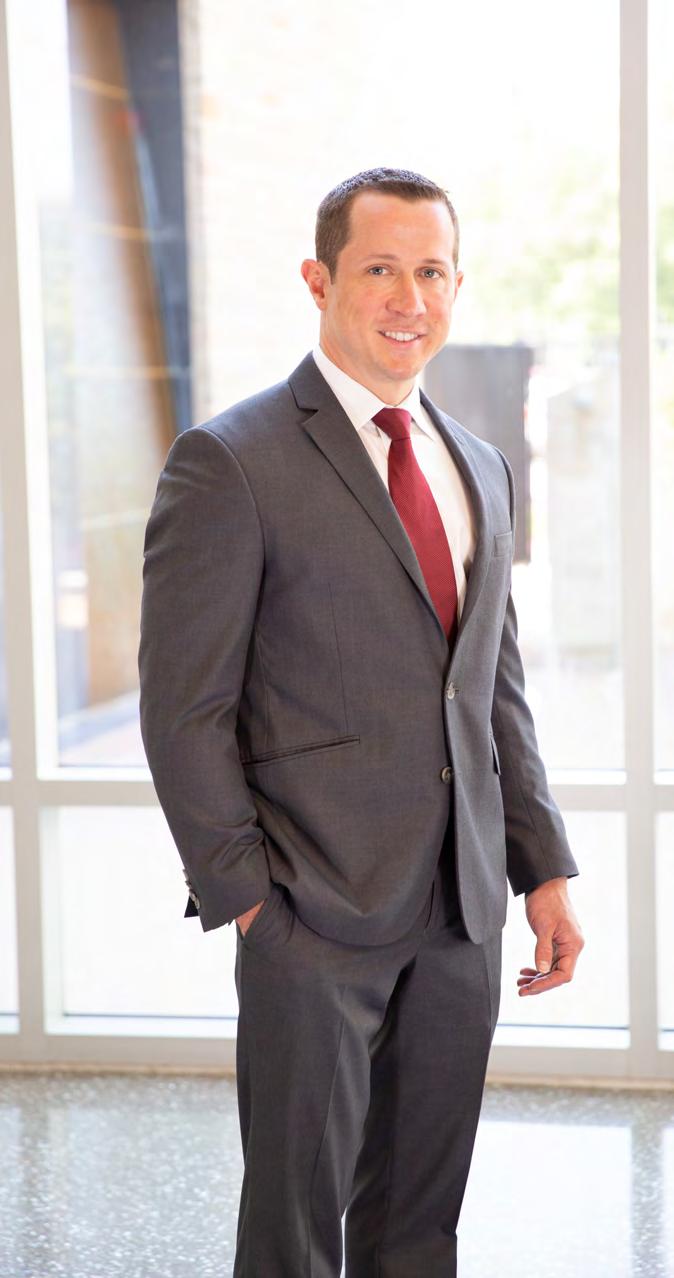
Dr. Chambers is an orthopaedic surgeon at Texas Bone & JointArlington who specializes in joint replacement surgery. He received extensive training in joint replacement surgery during his fellowship at Harvard Medical School / Massachusetts General Hospital, which was voted as the top hospital in the United States. Dr. Chambers has implemented the techniques learned at Harvard Medical School into his own practice and offers minimally invasive total hip / knee replacement, partial knee replacement, revision surgery for malfunctioning, loose, and infected joint replacements, arthroscopic surgery of the hip and knee, and revision of failed and recalled metal-on-metal total hip replacement implants. Dr. Chambers focuses special attention on surgical techniques for rapid recovery after total joint replacement which allow his patients a more predictable and earlier return to home and an active lifestyle.
Dr. Chambers is pleased to offer the MAKOplasty Robotic-Arm Assisted partial/total knee and hip replacement. The MAKOplasty procedure is changing the way joint replacement surgeries are performed by providing each patient with a personalized surgical experience based on their specific diagnosis and unique anatomy using a CT-based 3D modeling. The robotic arm technology allows for extremely precise placement of hip/knee components with potentially less soft tissue injury than traditional joint replacement.
Dr. Chambers is a Texas native and grew up in Houston, Texas. He attended medical school at The University of Texas Medical Branch in Galveston, and completed residency at John Peter Smith Hospital in Fort Worth, Texas. He then completed a fellowship in joint replacement surgery at Harvard Medical School. In his free time, Dr. Chambers enjoys traveling with his wife, Christine, and spending time with friends and family. He is an avid sailor and enjoys participating in sailing races on the local lakes in the Dallas/ Fort Worth area.


Robert Brunner, MD is a general urologist with Urology Clinics of North Texas serving patients in our Dallas office cated at Texas Health Presbyterian Hospital Dallas. A native of Toledo, Ohio, Dr. Brunner combines a robust academic foundation with extensive clinical expertise. He graduated magna cum laude from the University of Notre Dame, earning dual degrees in Economics and PreProfessional Studies. He then earned his Doctor of Medicine (MD) degree from the University of Toledo College of Medicine and Life Sciences, where he was inducted into the prestigious Alpha Omega Alpha Honor Medical Society.
Following medical school, Dr. Brunner completed his residency in Urology at Baylor College of Medicine in Houston, Texas, where he received comprehensive training in all aspects of adult urology. He developed specialized expertise in the management of stone disease and in the use of robotic-assisted surgery, particularly with the Da Vinci robotic system. Dr. Brunner is skilled in treating a wide range of both benign and malignant urologic conditions, with a particular focus on leveraging advanced robotic technologies to improve surgical outcomes and accelerate patient recovery.
Committed to providing exceptional care, Dr. Brunner is passionate about staying at the forefront of urologic advancements, ensuring that his patients benefit from the latest techniques and innovations in the fild.

• Bladder Cancer
• Blader Stones
• Enlarged prostate or benign prostatic hyperplasia (BPH)
• Erectile dysfunction
• Kidney stones
• Low Testosterone
• Male sexual dysfunction
• Overactive bladder
• Penile curvature or Peyronie’s disease
• Prostate Cancer
• Stress urinary incontinence (Male & Female)
• Testicular Cancer
• Ureteral Cancer
• Ureteropelvic juncion (UPJ) obstruction
• Urethral stricture
• Urinary retention
• Urinary tract infection (UTI)


By EMILY REED
Age is just a number. It’s an adage that has echoed through the ages, but its truth resonates louder the longer we live. Life, after all, is not about the years behind us but the spirit within us. George Burns, the legendary comedian who performed well into his nineties, once quipped, “You can’t help getting older, but you don’t have to get old.” Therein lies the secret—our outlook on life is what defies us, not the candles on the cake.
As we move through the seasons of life, it’s easy to fall into the trap of believing that certain things are behind us. We’re often told to slow down, act our age, or stay in our lane. But who sets these rules anyway? It’s our life, we get to write the narrative. Why not embrace the joy of being vibrantly and unapologetically alive? Why not wake up every morning with curiosity and the thrill of possibility?
Take it from the ever-inspiring Sophia Loren, who once said, “ There is a fountain of youth: it is your mind, your talents, the creativity you bring to your life and the lives of people you love. When you learn to tap this source, you will truly have defeated age.” Loren’s words remind us that youth is not something we lose with time; it’s something we cultivate by staying mentally active, sharing our gifts, nd pursuing our passions.
For many, turning 40, 50, or 60 can feel like a signifiant milestone, a marker of transition. But think about what milestones truly represent. They’re opportunities to celebrate how far we’ve come and to look forward to the adventures still ahead. Mick Jagger, the iconic Rolling Stones frontman who continues to tour and perform well into his eighties, is living proof that passion and purpose are timeless. “Anything worth doing is worth overdoing,” he’s been known to say. That’s the kind of zest we could all use—the freedom to dive into life with reckless enthusiasm, no matter our age.
Sometimes, it’s the small acts of rebellion against societal expectations that remind us of our youthful spirit. Maybe it’s picking up a new hobby—like learning to play the guitar or taking up watercolor painting. Maybe it’s dancing in the kitchen or fially booking that dream trip you’ve been talking about for years. Helen Mirren, who has become a global symbol of aging gracefully while remaining thoroughly dynamic, once said, “Aging has a wonderful beauty, and we should have respect for that.” Her wise perspective is a reminder that life just gets richer as we go.
A young heart doesn’t mean denying the wisdom we’ve gained over the years. It’s about merging that wisdom with playfulness. There’s beauty in dancing between these two states, and no one embodies this better than Betty White, who worked into her nineties with an infectious joy. She once said, “I may be a senior, but so what? I’m still hot.” That cheeky attitude is a lesson for us all—confidece and humor are ageless qualities.
Science even backs up the idea that staying young at heart has tangible benefits. Studies have shown that people who maintain a positive attitude about aging tend to live longer and have better physical and mental health. Thik about it: when we see life as an adventure rather than a decline, we’re more likely to stay active, engage with others, and embrace new experiences. Keeping a sense of humor is perhaps the easiest way to keep the years at bay. George Clooney joked, “I’ve learned one thing: if you’re not laughing, you’re crying.” Whether it’s laughing at the absurdities of life or at ourselves, humor keeps us light and reminds us not to take things too seriously.
Adventure, too, isn’t just for the young. It’s for the bold. It’s for anyone who decides to embrace the unknown and savor the journey. Julia Child didn’t even learn to cook until she was in her late 30s, and she didn’t become a household name until her fiies. Imagine if she had thought it was too late to start. Her life—and the lives of countless people she inspired—would have looked so different. Her story is proof that it’s never too late to reinvent yourself, to dream, and to chase something new.
Reinvention is one of the most exciting giftsof aging. For some, it might be returning to passions that were put on hold. For others, it might be fiding new communities or causes to dedicate time to. The world is full of opportunities to learn, grow, and thrive at every stage of life. As Diana Ross once said, “You can’t just sit there and wait for people to give you that golden dream. You’ve got to go out there and make it happen for yourself.” Her words are a call to action—to grab life by the horns and keep striving.
As we age, we also gain the ability to savor the moment more fully. There’s a freedom that comes with having nothing to prove. Oprah Winfrey summed it up beautifully: “With age comes the understanding and appreciation of your most important asset: your health.” Ths is the time to invest in self-care, not as a luxury, but as a celebration of all the years we’ve lived and all the ones we have yet to enjoy.
Let’s also take a moment to reflct on the beauty of connection. Staying social and forming relationships, both new and old, keeps us engaged and emotionally fulfilled. Whether it’s joining a book club, mentoring someone younger, or simply picking up the phone to call an old friend, these connections enrich our lives in countless ways.
Finally, let’s remember that every wrinkle and gray hair is a badge of honor, a testament to a life lived fully. As Joan Collins put it, “Age is just a number. It’s totally irrelevant unless, of course, you happen to be a bottle of wine.” So let’s embrace our vintage—aged to perfection and better with time.
Life doesn’t come with an expiration date for fun, joy, or growth. Age is not a limitation; it’s a gateway to more—more wisdom, more freedom, more adventure. To anyone reading this who’s feeling old, let this be your reminder: keep dreaming, keep laughing, keep learning. The best is yet to come.


In this special advertising section, the lawyers are listed in alphabetical order and by ad size. To learn more about the lawyers and their specialty, you can visit their websites provided. Their information presented in Living Well Magazine is not legal advice, nor is the Top Lawyers Section a legal referral service.
Throughout the year, readers and clients nominate attorneys they feel are great candidates for the Top Lawyer recognition by Living Well Magazine. Not all lawyers nominated opted to participate in this paid Top Lawyers Section. While we strive to maintain a high degree of accuracy in the information provided, we make no claim, promise, or guarantee about the accuracy of the information provided to us. Hiring an attorney is an important decision that should not solely be based upon advertising or the listings in this magazine.
Take your time and focus on finding an attorney that has dealt with your specific legal issue. You can usually find out basic information about any attorney you’re interested in online. Their websites generally list their specialties, where they went to school, and how long they’ve been practicing. The Dallas Bar Association and Collin County Bar Association are other great places to research information. Once you’ve narrowed down your search, make an appointment with any attorney you’re interested in and set up a consultation (find out if a fee is involved for the consultation). Be sure and take your list of questions with you to your consultation that are specific to your case.

Attorney Deandra M. Grant is the managing partner of Deandra Grant Law. She is an international speaker on DWI law, science and trial skills. As the author of the annually updated Texas DWI Manual, she is viewed by her peers as being a leader in her field. Deandra understands the science behind alcohol absorption and elimination rates and can use this knowledge to competently defend you.
Deandra was included in the list of Super Lawyers® for 2011-2012 and 2014-2024. Super Lawyers® is an attorney rating service that is nationally recognized throughout the legal community. The list represents no more than 5% of the attorneys in Texas. She is also AV® Preeminent™ Rated by Martindale-Hubbell®, which is the highest rating an attorney can achieve. She was given the AV® Rating for her outstanding professional achievements in the field of DWI law and her contributions to the legal community. She’s also received the highest rating of 10.0 by both AVVO and Justia.
Deandra graduated in 1990 from Trinity University in San Antonio with a B.S. in Business Administration. She earned her law degree from the SMU School of Law and was licensed by the State Bar of Texas in 1993. Having spent her last year of law school as an intern with the Dallas County District Attorney’s Office, she began work there as an assistant district attorney in January 1994.
Deandra’s tenure as a prosecutor focused on DWI prosecution. Upon leaving the DA’s Office, she opened her own criminal defense practice.
For over 30 years she has represented hundreds of Texans charged with criminal offenses, including DWI, violent felonies and sex crimes. As a former prosecutor, she knows firsthand how to counter the prosecutor’s evidence and strategy.
Deandra has spent hundreds of hours in training courses and programs related to DWI defense and has completed the certification course to administer standard field sobriety testing (SFST), the same National Highway Traffic Safety Administration training course that teaches police officers nationwide how to identify drunk drivers during traffic stops. She has also completed the SFST Instructor course and taught the SFST practitioner course to other attorneys. In 2008, she completed coursework on DWI forensic blood and urine testing.
In 2011 she received a certificate from the American Chemical Society in forensic chromatography. In 2012 she became a member of both the American Chemical Society and the American Academy of Forensic Science. Deandra earned the ACS-CHAL Forensic Lawyer-Scientist Designation in 2015. In 2016 she completed both a Graduate Certificate in Forensic Toxicology from the University of Florida’s College of Veterinary Medicine and a Master in Pharmaceutical Science—Concentration in Forensic Science from the University of Florida’s College of Pharmacy. In 2019 she joined the faculty at Axion Labs as an Assistant Chromatography Instructor.
Deandra is a former board member of the Texas Criminal Defense Lawyers Association. She is a Charter Member and former president of the DUI Defense Lawyers Association. She has served on the board of the Dallas Women Lawyers Association and served a term as president of the Dallas Criminal Defense Lawyers Association in 2022.
On a personal note, Deandra has been married to Eric Clendenin for over 20 years and is the proud mom of Keegan and Rowan. She is also the “mom” to five rescue dogs. She spends a great deal of time working with dog rescues and is Vice President of Living the Doxie Dream Rescue & Sanctuary, located in Royse City, Texas. Deandra is a self-proclaimed “wine snob” who collects wine.

We’re solely focused on family law. So you can fully focus on your family.
At KoonsFuller, we only practice family law. Which means we’re fully dedicated to serving Dallas area families and their unique legal needs. From informal negotiations to mediations, collaborative law to court proceedings, our thirty plus attorneys across four offices provide an unmatched network of expertise. Working together as a fully integrated team, KoonsFuller’s attorneys are equipped to handle estates of all sizes, cases of all complexities, and custody issues of any kind.
See what KoonsFuller can do for your family.Working together, as a fully integrated team, there is no case too large or complex for us to manage. To learn more about KoonsFuller, visit koonsfuller.com.


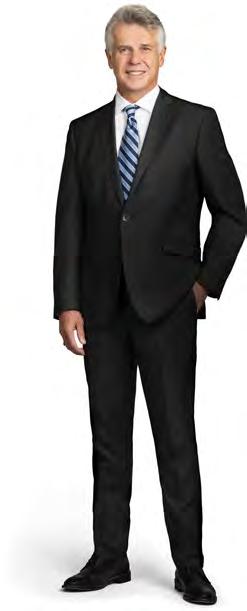

1717 McKinney Ave. Suite 1500 Dallas, TX 75202 (214) 871-2727 (Principal Office)
320 Eagle Dr. Suite 200 Denton, TX 76201 (940) 442-6677
W. Plano Pkwy. Suite 2200 Plano, TX 75093 (972) 769-2727
550 Reserve St. Suite 450 Southlake, TX 76092 (817) 481-2710

Attorney Christene “Chris” Krupa Downs focuses her practice on wills, trusts, advance directives, estate planning, guardianships and probate. She has over 14 years of legal experience handling estate planning, probate and guardianship legal matters for clients in Allen, Frisco, McKinney, Plano and throughout Collin, Dallas and Denton counties.
As part of giving back to the Texas Community, Chris serves on the board of the Wellness Center for Older Adults, an organization addressing the needs and concerns of Collin County’s older adult population. In 2022, she was recognized with the Athena award by the Plano Chamber of Commerce and the Community Service by a Woman Lawyer award by the Collin County Women Lawyers Association.
Chris’ mission is to make her clients feel valued and heard, understand their objectives and meet or exceed their expectations. She is an estate planning attorney engaged in kind and personcentered planning that enhances the systems of love and support for families throughout all walks of life. She helps families after the death of a loved one and guides families through the guardianship process.


As partners at Leu, Peirce & Olson, PLLC, a preeminent Elder Law firm in Plano, Lori Leu, Erin Peirce, and Lauren Olson are committed to providing quality, compassionate, and dignified services to their clients. Their boutique practice focuses on protecting seniors through Estate Planning, Guardianship, Medicaid and Veterans Benefits, Probate & Estate Administration, and Probate Litigation.
Lori Leu, a Certified Elder Law Attorney (CELA), graduated from Kansas State University and Harvard Law School. After practicing commercial litigation and telecommunications law, Lori attended SMU Perkins School of Theology and, in 2008, realized her calling of serving seniors and their families through the practice of Elder Law. Lori grew up in a small town in Kansas and raised her family in Plano.
Erin Peirce earned her undergraduate degree from Texas A&M University and her law degree from South Texas College of Law in Houston. She joined Lori Leu in 2011 to focus exclusively on elder law, where she has made a significant impact in litigating issues affecting the senior community. Erin is also a certified mediator in the State of Texas and a VA-accredited attorney. Aligning with the firm’s mission to advocate for the aging community and their families, Erin is committed to educating on long-term care planning as well as protecting the elderly from exploitation and abuse.
Lauren Olson began practicing with Lori Leu and Erin Peirce in 2013. Lauren is a Plano native and graduate of Saint Louis University and SMU Dedman School of Law. Lauren’s background as a social worker and member of AmeriCorps forms the foundation of her compassion and mission to help older adults and families along their aging journey.
The experienced and talented team at Leu, Peirce & Olson is devoted to empowering seniors and their families with advice on issues of long-term care, financial well-being, healthcare, and the ultimate disposition of assets, enabling their clients to plan for the future and age with grace and dignity. Along with their dedicated support staff, Lori, Erin, and Lauren focus all of their energy on making the legal aspects of aging easier for their clients. The emerging practice of Elder Law encompasses a variety of legal challenges experienced by seniors and their families, as well as those with special needs, and the attorneys at Leu, Peirce & Olson are committed to serving the unique needs of each client.
Rawlins Law Firm, LLC represents individuals across the state of Texas. Our firm specializes in providing representation to individuals and companies helping recover Diminished Value on their automobiles.
When your personal or company vehicle is involved in an accident and subsequently repaired, it will have an inherent lost value due to the loss history on the vehicle. When another person’s negligence causes the accident, you have the right to recover the lost value directly from that person’s insurance company.
Get in touch with us to set up a consultation to inquire whether our services are right for you. We at Rawlins Law Firm know that finding the right attorney to represent you is a choice not to be taken lightly. That’s why we offer free consultations to walk you through your needs, the scope of your goals, and your budget.



Craig Watson’s legal practice focuses on the areas of estate planning, probate, elder law and guardianship matters. He serves clients with large taxable estates as well as small non-taxable estates. His estate planning work includes the preparation of simple Wills and Revocable Trusts as well as complex estate plans involving By-pass Trusts and Marital Trusts. Craig also designs estate tax-sensitive plans that include charitable trusts, life insurance trusts, educational trusts, LLC’s and family limited partnerships. Craig’s probate practice is similarly broad and may include anything from probating a small estate all the way up to preparing and filing a federal estate tax return for a large taxable estate. As an elder law attorney, Craig handles nursing home Medicaid qualification, guardianships, wills, powers of attorney and medical authorizations for elderly clients.
Craig is a member of the Special Needs Alliance, a national, invitation only organization of attorneys committed to serving the legal needs of disabled individuals. Craig is certified as an Elder Law Attorney by the National Elder Law Foundation, which is recognized by the Texas Board of Legal Specialization. He is a Life Fellow of the Texas Bar Foundation, a member of the College of the State Bar of Texas, the National Academy of Elder Law Attorneys, and the Texas and Grayson County Bar Associations. He graduated from SMU School of Law in 1989 with a Juris Doctor degree. Prior to that, he practiced as a CPA in Dallas for four years after graduating with a degree in Accounting and concentration in Finance from Baylor University in 1982.
Craig is married and lives on a farm west of Sherman where he raises cattle.


Southwest Foot & Ankle Center is a respected group of board certified foot and ankle surgeons. They are fellow trained surgeons, and board certified in wound care and reconstructive surgery. All physicians have also completed an intense residency and fellowship in the area of limb salvage, and foot and ankle surgery. The team at Southwest Foot & Ankle Center strive to make each patient’s experience personable. Our outcomes are of perfection and meticulous in surgery. As a result, patients from all over the country seek to be treated by DFW Wound Care Center.
Bunion and Hammer
Correction MIS—Minimally Invasive Surgery
Heel Pain (Plantar Fasciitis) Stem Cell Therapy
Neuropathy
Toenails

Custom Orthotics & Braces
Laser Therapy for Pain, Swelling, Arthritis, and Wounds










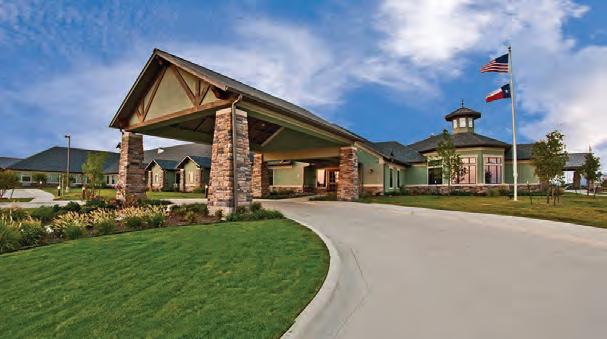



Have you been arrested? Whether you have been charged with DWI in Texas or another criminal offense, we advise you to secure the immediate representation of our experienced DWI lawyers. Your charges can have life-altering consequences. It is of the utmost importance that following an arrest, you hire our Dallas criminal defense lawyer. We will stop at nothing in order to protect your rights, freedom, and future. At Hamilton Grant PC, you will receive the individualized support and tenacious advocacy that you require in order to combat your criminal charges.
Because we care deeply about helping as many people as we can, our Texas DWI & criminal attorneys also represent clients in Collin County and throughout northern Texas.

Hamilton Grant’s North, East and South Texas offices are led by Attorney Deandra Grant*, JD, GC, MS, one of the most awarded and respected DWI authorities in the country. She is co-author of The Texas DWI Manual, certified in the science and testing of DWI enforcement, and respected by her peers as being a leader in her field.
